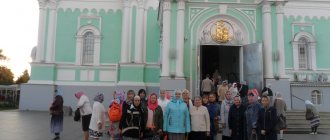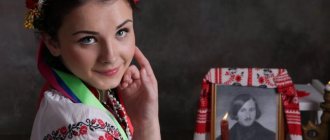How did the tradition of celebrating name days come about?
Name day is the day of remembrance of the saint.
Every day, millions of Christians venerate martyrs, venerable elders, and other religiously important figures. Each canonized hero has his own date in the monthly calendar. Some saints are so respected that they are honored several times a year. At the same time, saints with the same names are included in the calendar. Therefore, the Alexanders celebrate Angel Day 146 times a year. The calendar is mainly formed using the dates of deaths of cult figures for Orthodoxy. Martyrs, iconic church figures, and kings can be included in the caste of the revered. For example, in the “Saints” one of the dates is assigned to Nicholas II, who is considered a sufferer who died for his faith and fatherland.
Over the years, the Orthodox calendar became more voluminous. In the Middle Ages, they began to use it widely when choosing a name for a baby. The new parents believed that the saint, after whom the child was named, would always protect the baby. This is where the second name of the celebration came from - Angel's Day, which is celebrated in a similar way to birthdays. By the way, many Orthodox Christians prefer to celebrate name days instead of another anniversary. However, the dates of these events often differ.
Orthodox saints and saints
The faces of holiness are the various categories into which saints are divided in Orthodoxy during their canonization. The fact that saints belong to different ranks does not mean that some of them are “holier” or more authoritative than others. Holiness, that is, closeness to God, is the same for everyone. Metropolitan Hilarion (Alfeev) in his lecture “Faces of Holiness” points out that assignment to a certain face marks the time of life and the rank of a saint, the essence of his spiritual achievement. Knowing the peculiarities of the lives of the saints and studying their experience of salvation, Christians are inspired to imitate God’s saints and prayerfully communicate with them. Also, special holiday services are written for various saints.
Let us present the most famous faces of holiness.
Apostles are disciples of Jesus Christ (Peter and Paul).
Unmercenaries are Orthodox saints who became famous for their selflessness, their renunciation of wealth for the sake of saving their souls (Cosmas and Damian).
The pious are pious rulers. As a rule, monarchs and princes (Alexander Nevsky, Yaroslav the Wise).
Martyrs are Christians who accepted violent death for their faith (Cyprian and Justina). Great martyrs are those who have undergone particularly cruel torture (Panteleimon, St. George the Victorious). Hieromartyrs are martyrs who had holy orders: bishops, priests, deacons (Macarius of Kiev, Patriarch Hermogenes). Venerable Martyrs - Martyrs-monks (Eugene of Rome, Gregory of Pechersk).
Confessors are Christians who openly professed the faith and were tortured for it, but survived and died a natural death (John the Russian, Maximus the Confessor).
The righteous are the laity or representatives of the white clergy revered for their righteous life (John of Kronstadt, Simeon the God-Receiver).
ascetic monks (Sergius of Radonezh, Seraphim of Sarov).
Prophets are persons mentioned in the Bible who preached and proclaimed God's will to the people (Elijah, John the Baptist).
Equal to the Apostles are saints who, like the apostles, preached the Gospel and converted peoples to Christianity (Queen Helena, Princess Olga).
Saints are bishops glorified as saints (Ignatius Brianchaninov, Theophan the Recluse).
Passion-bearers are Christian saints who humbly and kindly suffered for the fulfillment of the Commandments of God (princes Boris and Gleb, Tsar Nicholas II and his family).
Wonderworkers are those saints who became famous for the gift of miracles (Nicholas the Pleasant, Spyridon of Trimifuntsky).
Fools ( blessed ) are ascetics who, in the name of God, took on the image of madmen (Basily the Blessed, Andrei the Fool).
Is there a name day tradition abroad?
Angel Day exists in many Christian countries. However, the attitude towards the holiday differs greatly depending on the orientation of the denomination. For example, Protestants do not venerate saints. In their canons there is no culture of worshiping martyrs, but in Orthodoxy and Catholicism this is a common practice. In Italy, the birthday person is given cakes, and in France, gifts are given. Today the rituals are rarely observed, but in extremely religious countries they continue to live on. For example, in Greece, Poland, Russia and the countries of the former CIS, where Orthodoxy is practiced. The name day tradition is also common in South America. Angel Day here is not limited to honoring saints: Latin American believers also venerate various images of the Virgin Mary.
Today, name days are common in more conservative families, so holiday parties to mark the occasion are less common. To mark name days, practicing Catholics and Orthodox Christians usually visit the temple and have quiet family celebrations.
Why do name day traditions not disappear?
Name day traditions do not disappear due to the fact that the position of Christianity is still strong. Therefore, any practices and church superstitions are still found in a progressive society. Often, even non-religious families turn to the Orthodox calendar in Russia. It happens that conservative grandparents insist that their children name their babies using “Saints”. One of our readers told the following story:
“My mother insisted on calling me Peter. As a result, they named me differently - the way my grandmother and father wanted. For the most part, I was named after one of the family members, but my grandmother also endowed the name with religious properties. I often receive congratulations from her on Angel Day, I know what my patron is famous for, and so on. Although I don't care about that. I cannot call myself a believer. By the way, parents are also not regular visitors to temples.
Despite this background, I am pleased to bear my name. Firstly, I like it, and secondly, it’s cool to realize that there is something sacred behind it. Not everyone can trump the fact that they are so knowledgeable in the etymology of their name. Although I still can't remember when my angel day is. But it’s okay, grandma will definitely remind you with a greeting card on WhatsApp.”
In addition to the influence of the older generation, the vitality of the tradition is also fueled by the number of believers. Still, in our country there are quite a lot of religious people who are sensitive to choosing a name according to the church calendar. For example, among Orthodox Christians there is a belief: if you name a child in honor of a martyr, he will suffer all his life. And if in honor of a saint, he will become a monk. People want to believe that the right patron will certainly protect them from failure.
Read on topic: Tell me what my name is: what you need to know about changing your name
Holy people of God are our older brothers
| Venerable Sergius of Radonezh. Icon of the 16th century. |
Tomorrow, my dears, our entire Russian Orthodox Church will reverently honor its great ascetic, the venerable abbot of the Russian land and God-bearing Father Sergius.
Many of the Orthodox Russian people will kneel in the Holy Lavra before the tomb of the celibate relics of the saint of God. You know that five and a half centuries have already passed since the earthly feat of St. Sergius ended. But his glory, which shines with the sacred and precious name of the great Sergius for every Orthodox Christian, does not fade and will never fade: “...The righteous live forever...” (Wisdom 5:15).
St. Sergius embodied the gospel virtues and showed them to us in his face in all their beauty. He was the bearer of a strong, never wavering, unquestioning faith in God, in the Holy Trinity, in our Savior, the Lord Jesus Christ. With this faith he came to the Radonezh forest and with this faith he walked his entire earthly path. He was a vessel of ardent love for people. St. Sergius was and remains an example of the greatest patience in hardships, sorrows and the fight against the invisible enemy of our salvation. He personified in his person true Christian humility. All of us, Orthodox people, know examples of his humility and meekness that captivate us with their spiritual beauty. He was great in his ardent love for his native people, for his native country, an ardent patriot of his fatherland. And we believe that St. Sergius, with his prayers, his undying love, his heavenly cover, is for all of us, for our country, for our native Russian Church, truly our heavenly abbot, our own father, who brings his fervent prayers before the Throne of God for us and He sends down to every sinful Orthodox soul who sighs before him his blessing, covered with fatherly love.
How happy we are, dear ones, that on our earthly path we have such powerful intercessors, such ardent prayer books, such loving heavenly patrons, to whom we can resort in all circumstances of life! We believe that not a single prayer of ours can go unheard by those who stand before the Throne of God and have from the Lord, for their righteous lives, the boldness to bring our sinful prayers to the feet of Christ.
We are happy not only because the holy saints of God are our prayer books and intercessors in the face of the common Heavenly Father, but also because the holy righteous are our older brothers, happy because we are with our saints in the closest living communion. Truly, this kinship of ours, our communication with the holy righteous, is for each of us a source of joy and consolation on our earthly path.
There are families in which brothers and sisters are mutually bound by ardent love for each other, and in this mutual, brotherly love, each member of such a good family finds moral support for himself in all circumstances of his life. In joy, he shares this joy with his close, beloved and loving brothers and sisters. In his grief, he shares it with those who sympathize with him, who cry together, who are close to him, who love him. All the more must this be said about that great family of God’s children, which consists of all the children of the Orthodox Church of Christ who have ever lived by faith in their Lord and are now living on earth. All of us, both the living and those who have departed to the Lord, and they who are at the Throne of God, are one family. Holy righteous people, holy people of God, are our brothers with whom we remain in continuous unity if we remain faithful children of the Heavenly Father and our Mother, the Orthodox Church.
I will remind you of the words of the holy Apostle Paul from his Epistle to the Ephesians.
The Holy Apostle says: “...you are no longer strangers and foreigners, but fellow citizens with the saints and members of the household of God” (Eph. 2:19). The Apostle founded the Church in Ephesus. This Church included both former pagans who converted to Christianity, and former Jews who converted from Judaism to Christianity. The pagan Christians carried some confusion and sorrow in their hearts. It seemed to them that they were less worthy of God’s love and had less right to inherit the Kingdom of Heaven, for they entered the Church from paganism, and the Jews accepted Christianity, already believing in the One God. And so the holy Apostle Paul, comforting them in their grief and explaining to them, wrote these words: “... you are no longer strangers and strangers, but fellow citizens with the saints and members of God’s household.” The Apostle said with these words that the suffering of Christ on the cross destroyed the wall between all the children of the Church of Christ and the saints, that the Divine Blood that washed the Cross of Christ makes all the children of the Holy Church who believe in the Lord Savior their own, close to both the Lord and His holy saints and equal in the face of the Heavenly Father. The Apostle Paul said this not only to the Ephesian Christians, but through them to all of us. All children of the Orthodox Church equally experience sweetness in communication with holy saints.
Is this really so? Are we really relatives of God’s holy people? Do they really - the apostles, prophets, martyrs, reverend fathers and mothers - recognize when we, with our immortal souls, enter into eternal life, in the person of us, our brothers, our relatives, our fellow citizens in the Kingdom of Heaven, in the House of our Heavenly Father? Yes, we are relatives, we are our saints. This is how the Holy Church teaches us, this is how the Apostle Paul commands us to believe. They and I are children of the same Heavenly Father. We are filled with the same grace of the Holy Spirit in the sacrament of baptism, which descended in this sacrament on St. Nicholas of Myra and on St. Sergius. In the holy sacrament of confirmation, we are sealed with the same seal of the Holy Spirit that St. Seraphim had on himself. We partake of the same Body and the same Life-giving Blood of Christ with which the holy saints partook, and this communion of ours in a special, highest degree testifies that we are members of the same Body of Christ, the Head of which is our Lord Jesus Christ. This holy sacrament primarily makes us all brothers in Christ, relatives and friends, and we are all fellow citizens of the saints and members of God, as the supreme apostle teaches us.
How much this communication with the saints gives to our believing spirit! What evidence in this communication of the correctness of our path to salvation, what a strong, firm hope for eternal salvation! After all, if we believe with the same faith with which the holy saints lived, it means that we are walking the right path to the Kingdom of God. If we fulfill the rules, sacred rituals, fasts, holidays, as the saints did, if we visit the same holy temple for prayer in which the saints of God prayed, then we are following a reliable path to eternal life. If we belong to the same Holy Church in which the saints of God served and preached, in which the holy martyrs gave their lives for the Lord, in which the reverend fathers labored, then we are children of the Kingdom of God, and our path to the life of the next century is the same how the saints walked. If the Orthodox faith, which they professed, led them to eternal glory, then it will lead to eternal glory, to eternal life with Christ and each of us who lives by this same strong, undoubted faith. If the grace of the Holy Spirit, which the holy saints were nourished by, strengthened their spiritual strength for the exploits of life according to the commandments of Christ, then it will not leave us on the same path. If the Holy Church was a guide for them to the Kingdom of Heaven, helped them to remain faithful to the Lord until death, then the Holy Church, to which we belong, like a mother leading her child by the hand, will lead us into the Kingdom of Heaven and make us heirs of eternal life in the home Heavenly Father.
We must always remember, my dears, something else. In order for our communion with holy people to never be interrupted or weakened, so that it passes into the future life, so that we, like them now, enter into eternal communion with the Sweetest Lord, we must not only profess the same Orthodox faith as the saints had, and to be a member of the same Holy Church with them, but also to imitate them in thoughts, actions, in their zeal for fulfilling the commandments of God, in their firmness and fidelity to the Lord and His Divine Word, in their labors in the matter of saving their souls. It is our Christian duty to imitate them in those sacred virtues which, together with their fiery faith and the gracious help of the Holy Spirit, brought them into the Kingdom of eternal glory.
The great Old Testament righteous man Abraham will not recognize us as his brothers if we do not try to imitate the power of his faith. What faith did righteous Abraham have! She did not hesitate when the Lord commanded him to go to an unfamiliar country, leaving his native land. The Lord directed him to the future Holy Land - Palestine. Abraham left his native place and went because he believed in the word of God. Even when the Lord, to test his faith, commanded him to raise his hand with a knife against his son Isaac in order to sacrifice him, Abraham, obedient to the voice of God, headed to the mountain to offer this sacrifice there (see: Gen. 22:1 -12). Such was the faith of righteous Abraham, which knew no hesitation or doubt.
The holy apostles of Christ will not consider us their children if we, knowing how they gave their lives in the name of saving people, in the name of their fiery love for people whom they wanted to save from eternal death with their ardent preaching, do not imitate them in our love for each other, and if there is no true Christian brotherly love in our heart.
The holy martyrs who suffered martyrdom for Christ will not call us their fellow citizens in the heavenly fatherland if in our earthly life, imitating them even in small ways, in what is within the power of each of us, we do not show patience in our sorrows, illnesses and deprivations .
The reverend fathers and reverend mothers will not see us as their relatives if we do not fight our passions, vices, swim on the waves of our passions, allow sin to rule our hearts, do not fear our eternal destruction and do not rush to wash our sinful, dirty heart with tears repentance. Following the example of the martyrs, saints, and apostles, one must be merciful, brotherly, not angry, patient in sorrows, complacent in adversity.
We also need to be able to bear our cross, which the Lord sends to each of us. Look at the saints. What virtue did they not show in their lives, and what sorrow did they not experience?! What deeds of love did they not leave us with for eternal edification and what disaster did they not experience in their earthly life?!
In the sacred book called “The Revelation of John the Theologian,” the Apostle of Christ talks about the vision that appeared to his eyes (see: Rev. 7:9-17). He sees the Throne of the Lord, on which the Lord sits, surrounded by many people in white robes and with palm branches in their hands. One of the elders standing near the Throne of God asks the Apostle: “... these clothed in white robes, who and where did they come from?” And he himself answers his own question: “These are those who came out of the great tribulation; they washed their robes and made them white in the blood of the Lamb. “...” They will neither hunger nor thirst anymore... and God will wipe away every tear from their eyes.” The saints knew how not to weaken in their love for God in the midst of the most difficult disasters and sorrows. And they received their reward.
If we come to eternal life without good deeds, without life achievements, without patience and humility in the midst of everyday troubles, only with our unrepentant sins, can the saints call us their brothers? They will tell us this: “Were we not the same people as you, with the same illnesses, sorrows, and infirmities? Didn’t the grace of God strengthen you just as it strengthened us in the days of our earthly life? Wasn’t the Lord, who promised to always be with His faithful children, always with you? Didn’t you have the boldness, just like we did, to call for help on the hands of God stretched out to you?” And woe to us, eternal woe, if in response to the love of the Father, to the great patience with which the Lord endures our sins and does not immediately punish us with the punishment that we must suffer, we do not live a life worthy of the children of the Heavenly Father. Woe to us if we do not strive with our thoughts, our hearts for the eternal Kingdom of Heaven, if we do not work on sinful hearts so that it does not distort the image of God in itself because of our sins and vices, and if we do not decorate it with eternal beauty, imitating the holy saints .
Tomorrow is the day of St. Sergius. Breathe from the depths of your soul to our reverend and God-bearing father Sergius with a prayer that he would send down upon us the blessing of God, quenching our sorrows, softening troubles, drying tears, healing illnesses, and most importantly, strengthening us on the Christian path.
May our prayer not fade, our faith not weaken, may the flame of love for our Savior, the flame of love for each other always shine in our hearts! Let the thirst to save our soul not die in us and the fear of our eternal death not leave us! Let us steadily move through sorrows, trials and labors, in the name of the salvation of the soul, into that Kingdom of glory, where all of us, earthly members of the holy family of Christ, will unite with our older brothers, God's saints, in the bosom of our beloved Heavenly Father!
Word spoken in the Church of the Transfiguration in Moscow
Is it worse next?
Despite the fact that name days are still alive, it is difficult to imagine that in a few centuries we will see celebrations on their occasion. And here are a few reasons why:
- The Soviet legacy destroyed Christian traditions. It is obvious that the demolitions of temples and persecution had a negative impact on religion. Among the inhabitants of the USSR, birthdays were held in higher esteem than their Orthodox counterpart. Therefore, today we less often see people celebrating the day of their heavenly patron.
- The position of religion has become weaker. The Soviet legacy again played a big role in this. But even if we put this aspect aside, it becomes clear: it is difficult for religion to find a place in the modern world. Today people think less about their worldview. Even previously popular atheism seems to have lost some of its ground. People in general are not particularly interested in believing in anything or vice versa.
- Globalization has affected variability. Today, children are increasingly given unique names. This practice is common even among believers. At baptism, they look for an analogue to the unusual name of their child. Churchmen usually do not discourage this practice. For example, Katharina’s patron saint would be a saint named Catherine.
Of course, in traditional families, angel days will still be relevant, but the number of these families is steadily declining. And we can hardly expect a strengthening of the position of religion in the coming years.
Who are the saints in Christianity
Thus, holy people in Orthodoxy are not just good and pious, but those who have opened their purified hearts to God in an effort to unite with Him. And the more a person is illuminated by grace, the better he sees his imperfection and distortion by sin. A true saint will be a righteous person for those around him, but he will perceive himself as the last sinner.
Separately, it is worth noting that the concepts of “holy” and “sinless” are synonymous only in relation to God. God is holy and sinless. A holy person does not mean sinless. But he has a persistent desire to overcome sin with God's help. Let us remember the words of the Holy Scripture: “A righteous man will fall seven times and rise again” (Proverbs 24:16).
Archpriest Andrei Tkachev in one of his sermons by Fr.
Metropolitan Anthony of Sourozh in one of his conversations called the saints people through whom God acts and shines. Through them the Spirit of the Lord can perform miracles. During their lifetime, many Orthodox saints acquired the gift of clairvoyance, healing the sick, and after death they help those who pray to them. Often the remains of saints remain incorrupt. On the basis of these miracles and popular veneration, the Church canonizes God's saints, that is, glorifies them as saints.
Such a procedure in itself does not make a person a saint; it only states what has already happened in heaven long ago. The canonization of a righteous person does not imply approval of all his statements or actions. The saints of the Orthodox Church were people of their era, often with their own mistakes and infirmities, which did not prevent them from approaching God.










